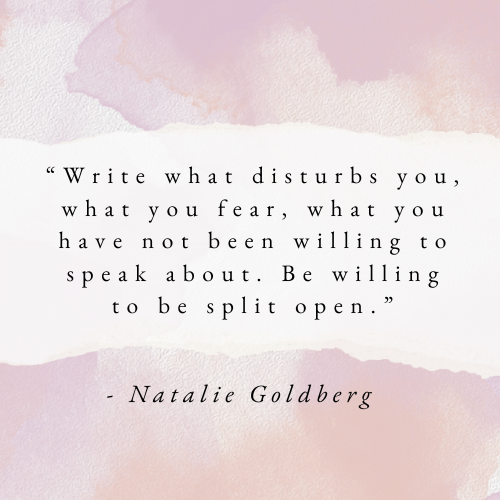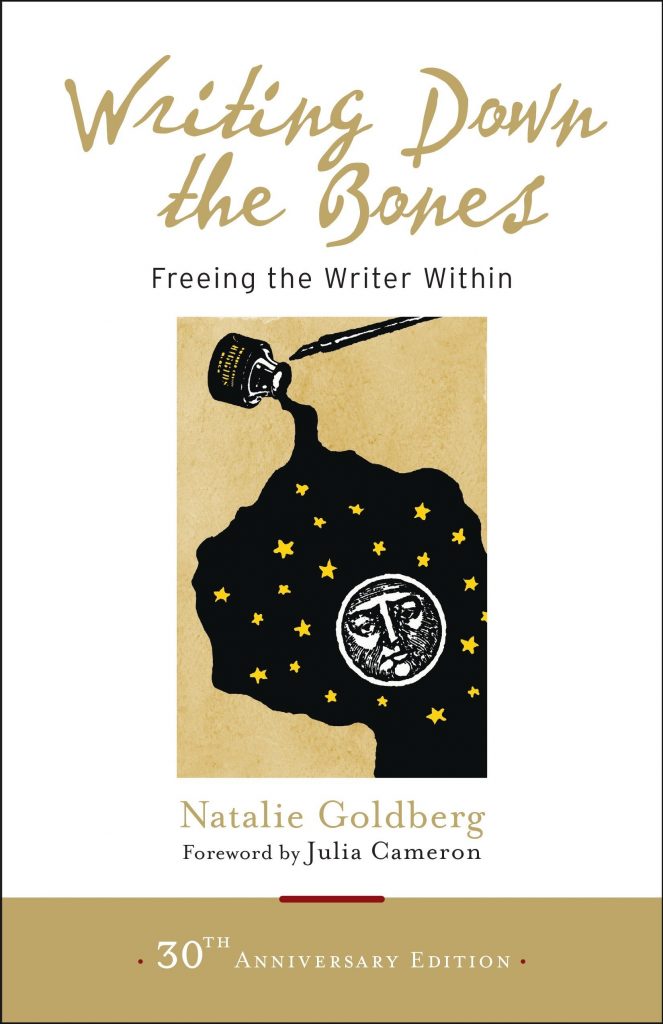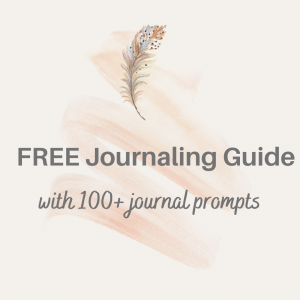Words of Wisdom from Writing Down the Bones by Natalie Goldberg

This is hands-down the best ever book I’ve read on writing (so far). The back cover says:
With insight, humor, and practicality, Natalie Goldberg inspires writers and would-be writers to take the leap into writing skillfully and creatively. She offers suggestions, encouragement, and solid advice on many aspects of the writer’s craft- on writing from “first thoughts” (keep your hand moving, don’t cross out, just get it on paper), on listening (writing is ninety percent listening; the deeper you listen, the better you write), on using verbs (verbs provide the energy of the sentence), on overcoming doubts (doubt is torture; don’t listen to it)-even on choosing a restaurant in which to write. Goldberg sees writing as a practice that helps writers comprehend the value of their lives. The advice in her book, provided in short, easy-to-read chapters with titles that reflect the author’s witty approach (“Writing Is Not a McDonald’s Hamburger,” “Man Eats Car,” “Be an Animal”), will inspire anyone who writes-or who longs to.
I also recommend listening to the audiobook version of this book. It was a treat to listen to Goldberg’s slow, soothing voice, enhanced by her slight Jewish New Yorker inflection. Goldberg is an incredible storyteller and it was such a delight! It has been over thirty years since this book was first published, and Goldberg’s insight and advice is still as relevant today as it ever was. So I would affirm that this book is a classic ‘must-read’ for aspiring writers, as well as anyone who is curious about the craft and practice of writing. Here are my key takeaways:
1. Be vulnerable when you write
“Write what disturbs you, what you fear, what you have not been willing to speak about. Be willing to be split open.”
2. Don’t be afraid of the negative voice inside you
“If you are not afraid of the voices inside you, you will not fear the critics outside you.”
3. We can meet ourselves through writing
“I don’t think everyone wants to create the great American novel, but we all have a dream of telling our stories-of realizing what we think, feel, and see before we die. Writing is a path to meet ourselves and become intimate.”
4. Don’t underestimate the power the writing by hand
“Handwriting is more connected to the movement of the heart.”
5. A good pen is important
“First, consider the pen you write with. It should be a fast-writing pen because your thoughts are always much faster than your hand. You don’t want to slow up your hand even more with a slow pen. A ballpoint, a pencil, a felt tip, for sure, are slow. Go to a stationery store and see what feels good to you. Try out different kinds. Don’t get too fancy and expensive. I mostly use a cheap Sheaffer fountain pen, about $1.95…. You want to be able to feel the connection and texture of the pen on paper.”
6. Get into a state of flow when you are writing
“keep your hand moving”
7. Freedom comes from clarity
“There is freedom in being a writer and writing. It is fulfilling your function. I used to think freedom meant doing whatever you want. It means knowing who you are, what you are supposed to be doing on this earth, and then simply doing it.”
8. Writing requires practice
“It is odd that we never question the feasibility of a football team practicing long hours for one game; yet in writing we rarely give ourselves the space for practice.”
9. The recipe for being a good writer
“Basically, if you want to become a good writer, you need to do three things. Read a lot, listen well and deeply, and write a lot. And don’t think too much. Just enter the heat of words and sounds and colored sensations and keep your pen moving across the page. If you read good books, when you write, good books will come out of you.”
10. Hard work pays off
“It’s pretty nice to be talented. If you are, enjoy, but it won’t take you that far. Work takes you a lot further.”
11. If you want to get high, don’t drink whiskey
“This is why it is good to remember: if you want to get high, don’t drink whiskey; read Shakespeare, Tennyson, Keats, Neruda, Hopkins, Millay, Whitman, aloud and let your body sing.”
12. Just write
“Finally, one just has to shut up, sit down, and write. That is painful. Writing is so simple, basic, and austere. There are no fancy gadgets to make it more attractive. Our monkey minds would much rather discuss our resistances with a friend at a lovely restaurant or go to a therapist to work out our writing blocks. We like to complicate simple tasks. There is a Zen saying: “Talk when you talk, walk when you walk, and die when you die.” Write when you write. Stop battling yourself with guilt, accusations, and strong-arm threats.”
13. Don’t worry about security
“This all happened fifteen years ago. A friend once told me: “Trust in love and it will take you where you need to go.” I want to add, “Trust in what you love, continue to do it, and it will take you where you need to go.” And don’t worry too much about security. You will eventually have a deep security when you begin to do what you want. How many of us with our big salaries are actually secure anyway?”
14. Write about memories
“Begin with “I remember.” Write lots of small memories. If you fall into one large memory, write that. Just keep going. Don’t be concerned if the memory happened five seconds ago or five years ago.”
15. Practice writing as often as you can
“It’s good to go off and write a novel, but don’t stop doing writing practice.”
16. Make a list of things to write about
“Add to the list anytime you think of something. Then when you sit down to write, you can just grab a topic from that list and begin.”
17. Writing inspiration is everywhere
“How to generate writing ideas, things to write about? Whatever’s in front of you is a good beginning. Then move out into all streets. You can go anyplace. Tell me everything you know. Don’t worry if what you know you can’t prove or haven’t studied.”
18. Just write
“Tell about the quality of light coming in through your window. Jump in and write. Don’t worry if it is night and your curtains are closed or you would rather write about the light up north—just write. Go for ten minutes, fifteen, a half hour.”
19. Being an artist can be challenging
“Being an artist in our society makes us lonely. Everyone else leaves in the morning for work and structured jobs. Artists live outside that built in social system.”

